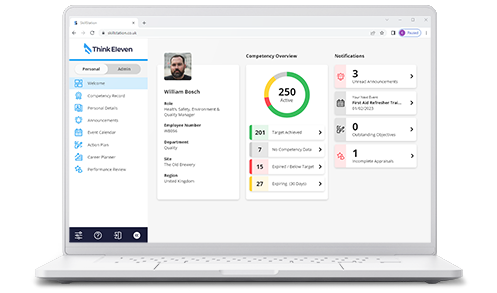Working with Allergens and Special Diets (For Chefs and Managers) eLearning Course
Overview
Chefs and managers carry ultimate responsibility for ensuring food is safe for every customer. With food allergies rising sharply, over 150 million people across Europe now suffer from allergic diseases, and around 10 people a year in the UK die from food induced anaphylaxis. This training goes beyond the basics. It equips kitchen leaders with the knowledge, systems, and practices needed to protect both guests and the business.
The course begins by defining what allergens are, the difference between an allergy and an intolerance, and an in depth look at the 14 major allergens. You’ll explore not only where these appear but also how they can be “hidden” in ingredients, sauces, or manufactured products. The module also explains your legal responsibilities under the Food Information Act 2014 and Natasha’s Law (2021), including clear rules around labelling, packaging, and communicating allergen information. Importantly, it reinforces that customers may be allergic to any food, so every query must be taken seriously.
Learners then build the practical skills to manage allergens safely across the entire food cycle, from delivery and storage, through preparation and service. This includes safe labelling, handling “may contain” warnings, recognising alternative ingredient names (e.g. “casein” for milk), and recording information accurately for due diligence. You’ll also learn the importance of briefing both Kitchen and Front of House staff and developing a major allergy plan along with communicating clear allergen information to customers.
Finally, the course widens the lens to cover special diets, from coeliac disease to pregnancy considerations, and from halal/kosher requirements to vegetarian and vegan diets. By the end, chefs and managers will have the confidence and tools to keep guests safe, lead compliant kitchens, and set the right example for their teams.
Key benefits of this module:
- Understand the 14 allergens, hidden risks, and alternative ingredient names
- Apply allergen management across delivery, storage, preparation, and service
- Identify pre packaged foods that may be used and ensure the correct labelling
- Read and use labels effectively, including “may contain” information
- Recognise allergic reactions and take the right action in emergencies
- Record allergen information accurately and communicate it clearly
- Apply best practice to minimise cross-contamination in kitchens
- Build awareness of health, religious, and lifestyle dietary needs
Format
The course is delivered fully online and is split into five highly interactive sections. Learners will engage with videos, case studies, questions, and activities that use real hospitality situations and finish with a quiz to ensure points are remembered and understood. The module may be completed in short sections over a period of time or all at one go! In addition, there are links to websites and documents that can be used to research further learning.
Modules include:
- Introduction to Allergens & Intolerances
- 14 key allergens
- Allergic reactions
- Think allergen in the kitchen
- Other diets
Aims of the Course
By completing this training, learners will be able to:
- Identify 14 major allergens and the foods that contain them
- Identify key allergic reactions and the action you should take
- Identify ways to record allergens and communicate information
- Identify where cross contamination of allergens may take place in the food cycle
- Identify special dietary requirements that a customer may have
Accreditation
This module is accredited by the Institute of Hospitality.
Who Should Take This Course?
This training is designed for chefs and managers working in any hospitality setting, particularly restaurants, bars, and event venues. It is recommended even for those holding a Level 2 Food Safety certificate, as this module provides greater depth and practical application.
It can be used as part of induction, refresher training, or to meet specific compliance needs. The course also supports Level 2 Commis Chef apprenticeships and contributes to required off-the-job training hours.
Test
At the end of the course, learners complete a 24-question quiz in the same style as the learning activities (drag-and-drop, single choice, multiple choice). The pass mark is 80%, with unlimited retakes. Certificates are available instantly upon passing..
Post-Module Action Plan
To ensure training translates into workplace practice, learners can download two tailored action plans:
- A self-assessment of how allergens are managed across the food cycle in the kitchen.
- A checklist of company procedures to follow if a customer or colleague develops an allergic reaction.
Managers can use these action plans as discussion tools to embed learning, check compliance, and build team confidence. Additional resources and links are also provided for further learning.
This course has a minimum of 25 learner registrations for us to provide a quotation.
Request a Quotation- Language
- UK
- Date last updated
- 9/11/2025
- Duration
- 1 Hour
- Suitable Devices
-
- PC
- Phone
- Tablet
- Audio is Required
-
- Yes
- Includes Video
-
- No
- Downloadable Resources
-
- Factsheets
- Workbook
- Completion Criteria
-
- Pass final test
- Pass Mark
-
- 80% pass mark required
- Course Technology
-
- HTML5
- SCORM 1.2
- Can be customised
-
- Available at an Additional Cost
- Accreditation or Endorsements
-
- The Institute of Hospitality
- Languages
-
- Available at an Additional Cost
